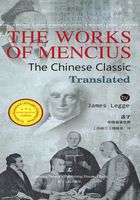
CHAPTER IV
1. Mencius said, 'Benevolence brings glory to aprince, and the opposite of it brings disgrace. For theprinces of the present day to hate disgrace and yet to live complacently doing what is not benevolent, is like hating moisture and yet living in a low situation.
2. 'If a prince hates disgrace, the best course for him to pursue, is to esteem virtue and honour virtuous scholars, giving the worthiest among them places ofdignity, and the able offices of trust. When throughout his kingdom there is leisure and rest from externaltroubles,


2. 力不瞻 is translated by Julien,—'quia nanpe vires(i.e. vis armorum) ad id obtinendum nou sufficiunt'.Possibly some Chinese commentators may have sanctioned such an interpretation, but it has nowhere come under my notice. The 'seventy disciples' is giving a round number, the enumeration of them differing in different works. We find them reckoned at 73, 76, &c.See in the prolegomena to vol. i, p. 112. For the ode see the Shih-ching. III. i. Ode X. at. 6, celebrating the influence of the kings Wăn and Wû. The four quarters are to be viewed from Hâo (镐), king Wû's capital. 思is not to be taken as an abstract noun, = 'thought'. 邹耗, a statesman and scholar of the eleventh century,says on this chapter:—'He who subdues men by force,has the intention of subduing them, and they dare not but submit. He who subdues men by virtue, has no intention to subdue them, and they cannot but submit.From antiquity downwards there have been many dissertations on the leaders of the princes, and the true sovereign, but none so deep, incisive, and perspicuous as this chapter.'
CHAPTER 4. GLORY IS THE SURE RESULT OF BENEVOLENT GOVERNMENT. CALAMITY AND HAPPINESS ARE MEN'S OWN SEEKING.
1. 居不仁, literally, 'to dwell in not-benevolence', i.e.complacently to go on in the practice of what is not benevolent.
2. 莫如 covers as far as to 政刑,


let him, taking advantage of such a season, clearly digest the principles of his government with its legal sanctions, and then even great kingdoms will be constrained to stand in awe of him.
3. 'It is said in the Book of Poetry,
"Before the heavens were dark with rain,
I gathered the bark from the roots of the mulberry trees,
And wove it closely to form the window and door of my nest;
Now, I thought, ye people below,
Perhaps ye will not dare to insult me."
Confucius said, "Did not he who made this ode understand the way of governing?" If a prince is able rightly to govern his kingdom, who will dare to insult him?
4. 'But now the princes take advantage of the time when throughout their kingdoms there is leisure and rest from external troubles, to abandon themselves to pleasure and indolent indifference;— they in fact seek for calamities for themselves.
5. 'Calamity and happiness in all cases are men's own seeking.


and 贤者在位 and the next clause are to be taken as in apposition simply with the one preceding. See the Doctrine of the Mean, chap. xx. The 贤者在位 here corresponds to the 尊贤 there, and the 能者在职 may embrace both the 敬大臣 and the 体羣臣. 刑,—not punishments, but penal laws.
3. See the Shih-ching, I. xv. Ode II. st. 2, where for 今此下民 we have 今女下民, the indifference not affecting the sense. The ode is an appeal by some small bird to an owl not to destroy its nest, which bird, in Mencius's application of the words, is made to represent a wise prince taking all precautionary measures.
4. 般,—read p'an, 2nd tone, nearly synonymous with the next character,—乐 (le).


6. 'This is illustrated by what is said in the Book of Poetry,—
"Be always studious to be in harmony with the ordinances of God,
So you will certainly get for yourself much happiness;"
and by the passage ofthe Tâi Chiah,—"When Heaven sends down calamities, it is still possible to escape from them; when we occasion the calamities ourselves, it is not possible any longer to live."'